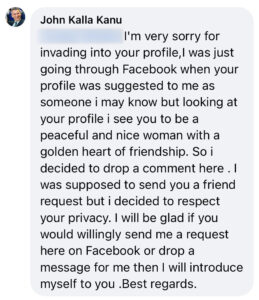This potential romance scammer picked the wrong person to mess with when he messaged one of our Elder Financial Safety Center team members and her three friends on Facebook.
Financial Coach Debbie Burkham responded to a friend’s Facebook post about his birthday celebration last week, with a simple “Happy Birthday.” It turned out the friend’s original post was fully public and not set to “only be seen by friends”. Debbie and three of her friends all received replies that read:

Debbie could tell right away this was not a simple greeting and warned her friends not to reply. But what tipped her off?
- The potential scammer posted this exact same message to four different women on the same post.
- She saw that Mr. Kanu lived in the Netherlands but was looking to meet people in Texas.
- She checked to see if Mr. Kanu was a Facebook friend of the person who was celebrating the birthday. He was not on his list of friends.
- She looked at Mr. Kanu’s Facebook account and saw he had very limited information about himself, very few photos, and no friends.
- She did a reverse Google image search and saw the man’s profile picture had originally appeared in an advertisement for a suit store.
“Don’t respond and definitely don’t send a friend request, until you have investigated,” Debbie warns. She recommends researching the person like she did.
- Look at the words the potential scammer uses – do they make you uncomfortable? If so, avoid this person.
- Do they live far away but are looking to make friends in your area? That’s a red flag.
- Look at the original poster’s friend list. Is the person in the message a friend of his or hers? If so, ask the original poster in a private message to tell you about the person messaging you. If he or she doesn’t know him, that’s a danger sign.
- Look at the person’s Facebook profile. Is it brand new? Do they have any friends? Do they have any detailed information? If it is a new profile and contains very little information, that is a red flag.
- You can do a reverse Google search of the potential scammer’s profile picture to see if it appears anywhere else on the internet. Learn how here: https://www.youtube.com/watch?v=uxiUXhBEb6A
- Google the person’s name and see if anyone else has reported being scammed by him or her.
If you see any warning signs do not engage with the message and educate your friends on how to protect themselves too.
The FBI website on elder fraud says seniors were scammed out of more than $4 billion in 2020 and it is a growing problem. They also list additional tips to protect yourself and report fraud if you have already been victimized. Visit their website at: https://www.fbi.gov/scams-and-safety/common-scams-and-crimes/elder-fraud.
The Senior Source’s Elder Financial Safety Center also is here to help protect Dallas-area seniors from scammers and prosecute those who commit fraud. Contact us at info@theseniorsource.org or call (214) 823-5700.

